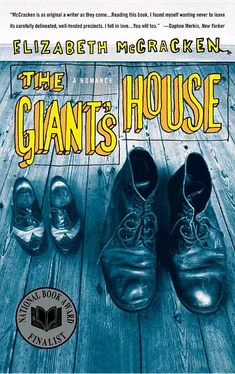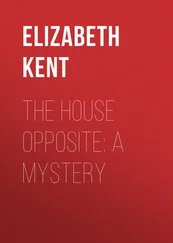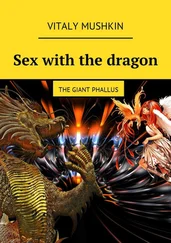His beautiful, useful hands!
His chest is barrel-shaped. The scapular borders are straight, and the curves of the clavicles are straightened out a little from normal. His heart shares in his proportions .
I’d already grown to hate metaphorical descriptions of James. Here was a catalog of his every part by a man who would not know a metaphor from a semaphore, and it was so ugly I could barely read it.
He has been bothered much by the curious, who want to see such a freak .
The last three paragraphs were a discussion of circus giants and their humbuggery. The Life of Barnum, Written by Himself was one of the footnotes.
I could not imagine how this quack — this man-measurer who couldn’t even remember to bring a measuring tape — could have met our James and come away being anything but astounded. James was nowhere in any of it, except in the table charting his growth.
Perhaps young Ernest Calloway, M.D., was tortured by bedtime stories, perhaps he heard “Jack and the Beanstalk” and was thereafter pursued in nightly dreams by a giant. That the giant died at the end of the story was not enough; little Ernie grew up to be a man who intended to prove that there was no such thing. Men who claimed to be eight foot four were really six foot seven. They wore lifts in their shoes and huge feathered hats. They were just trying to scare you, trick you, but they were frauds.
When he met a man as tall as the rumors, as tall as a bedtime story, he had to dispose of him in a different way. The giant is stupid, the giant is slow, the giant is ugly. The giant is no match for Ernest Calloway, M.D., giant-slayer.
Dr. Calloway’s article proved one thing to James: no matter what, people would think terrible things about him.
He could hold his paintbrush while he talked to them. He could discuss nineteenth-century artists, or thirteenth-century royalty, or twentieth-century comic book characters; he could look at a speaker evenly, listen expertly, ask questions. “Where in Maine?” he’d say, or, “Is accounting rewarding work?” hoping that if he showed enough interest in a visitor, they’d be a little less interested in him. It would just be an ordinary conversation then, the sort that goes on in diners, or across the seats in a taxicab, or during an insurance transaction.
But nothing worked. In the end visitors went away, remembering only that they had talked to the Tallest Man in the World, whose name they had probably not bothered to learn. After a while he started asking money for photographs. “A little money for my trouble,” he said, charging more to people he thought could afford it, to those he did not like.
That summer, New York beckoned.
It had been beckoning all along, of course. Not the way Cape Cod is always beckoning, its curled finger saying to the whole rest of the country, come a little closer, till on the Fourth of July weekend the rest of the country is unaccountably standing on a beach in Provincetown, wondering: How did I get here? And: Is this all there is? New York’s call was neither subtle nor polite, and it came in the form of a nineteen-year-old boy who said to me and his aunt and uncle: I have to go. When we expressed doubts, he said: I have to go before I die.
“I’ll go with the circus if you think that’s the best thing,” he said to me. He’d written a letter to Hugh Peters, the president of the shoe store chain, who never responded. Yes, I told him with relief, I thought it was.
“It’s time for me to get over my stage fright, I guess,” he said. “Not that it’s the stage I’m frightened of.”
“What, then?”
He looked wistful, the way fear sometimes resembles wistfulness. “It’s stupid. Fire.”
There had been a famous awful circus fire fifteen years before. Exits had been so badly marked that people died in an avalanche of audience pushing to escape. “But you won’t be in a tent. That was the problem. This is indoors. Fire exits marked. And think about how much more careful they have to be now.”
“No, that’s not the fire I meant.” Still, he shivered, thinking of it. “I meant all of those Barnum fires. The one where the giantess had to be lifted out by a crane. That was an indoor fire.”
Well, yes, and how did he know that? Years before I’d given him books, practically a blueprint of what he should plan to be terrified by in years to come. “They’re prepared now,” I said. “And if there’s a fire, I promise you’ll be rescued first. We’ll have it written into your contract.”
“You’ll come with me?” he said.
I was startled — not by the request but by the realization that I’d always assumed I would. It seemed only sensible that I chaperone. It was summer and Oscar was busy with his hotel, and Caroline, as always, was busy with Alice. Of course I would go along.
So we wrote a proposal to Barnum and Bailey. An appearance in New York; private hotel rooms for him and for his chaperone, Miss Peggy Cort; the center ring, not the sideshow. If everything went well, he’d consider other appearances.
He read his letter aloud to me. “ ‘Perhaps I’m asking for a lot, but as you have no doubt read, I’m not an ordinary …’ I can’t figure out what word to put there.”
“Man? Performer? Attraction.”
“Oddity,” he said. He gave the word a French lilt; it was a term he’d probably pulled from a book. “I am not an average oddity.”
In two weeks the circus sent a contract with every condition met. Once he’d signed, they sent an advance of a thousand dollars, along with a photographer to take pictures for the program.
“I can do magic tricks,” James told the photographer. “Do you think they’ll want me to do some?”
“Yeah? What kind?”
“Card tricks.”
“Aw, that’s no good. You’re playing Madison Square Garden! The only person’ll be impressed is the ringmaster, ’cause he’s the only one who’ll see. Learn to disappear an elephant, and maybe you got an act.”
The circus wanted to fit him for costumes — a cowboy suit, perhaps. No, said James. How about a tuxedo, they said, with a nice top hat.
“I’m tall enough,” James said, remembering Dr. Calloway’s descriptions of giant fakery. “I don’t need any gimmicks.” The circus people couldn’t disagree.
With some of the money, he ordered two nice suits.
I myself hadn’t been in New York for years. At one time in my life I’d thought I’d want nothing so much as to live there. I had a college friend whose parents had an apartment near Central Park; I visited them once a year. They took me to dark wooden restaurants, to museums and concerts. The colors of everything from the red flannel hash to the faded brownstones were beautiful, and I was filled with the sort of longing a particularly handsome man in a black and white movie can induce, a longing so intense and fruitless that it feels like nostalgia.
What I did not take into account was that it was spring, and my friend’s family was rich. Enough fine weather and money and a few memorable meals make any place desirable. As soon as I realized that, New York lost much of its charm for me.
So I resolved to look at the city differently this time. I would be a simple, easily dazzled tourist. I planned to crave hot dogs and roasted chestnuts from the street. I wanted to visit the zoo in Central Park. In short, I was traveling with a nineteen-year-old boy, and I intended to tour the city indulging nineteen-year-old tastes.
I hadn’t taken a vacation in the nine years I’d been at the library. Astoria agreed to work that week for me — not that I’d wanted to take that much time off, but James wanted to see the city, and the Cape Cod — New York trains only ran weekends. So the circus booked our seats, and Oscar drove us to Hyannis in my car, and first thing in the morning on a Saturday in late August, James and I rode to New York City, to begin what turned out to be his public life.
Читать дальше












